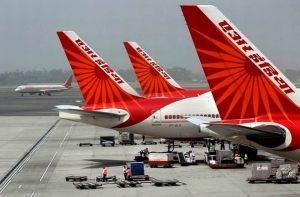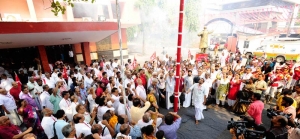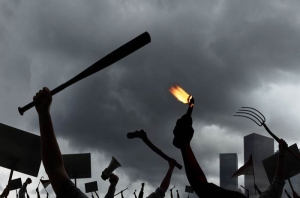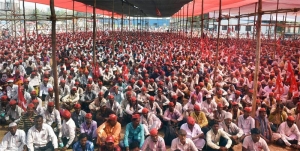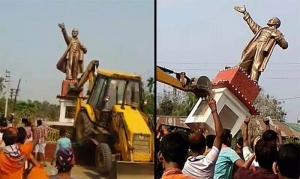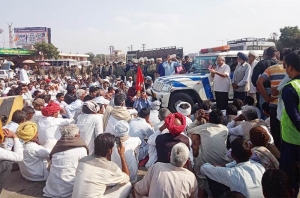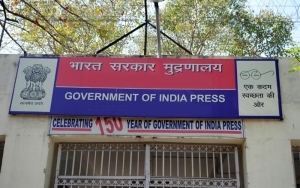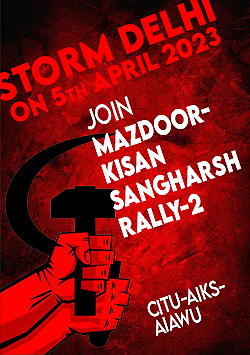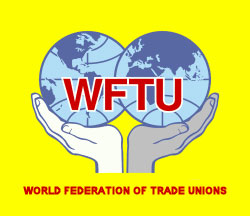Super User
CITU DENOUNCE FIXING PANCHAYAT ELECTION IN WEST BENGAL ON MAY-DAY BY THE TMC GOVT
The Centre of Indian Trade Unions denounces arbitrary and authoritarian decision of the TMC Govt in West Bengal in fixing the Panchayat election date on 1st May 2018- despite it being the Day of International Solidarity of the Working Class recognized internationally including ILO.
All the trade unions in West Bengal urged upon the state government for changing the date and keep the day free for observance of May Day jointly by all the trade unions throughout the state which had been the longstanding practice since last couple of decades in the state. But owing to its brazenly anti-worker and authoritarian attitude towards the working class and the people and their basic democratic rights and activities, the TMC Govt in the state stuck to their decision bulldozing the just requests by all the trade unions in the state.
And the same attitude of arrogance and authoritarianism towards democracy and public opinion is also being reflected in the ongoing violence being perpetrated by the hooligans with the patronization of the state govt against the people trying to prevent them from even filing nomination papers for the election; many CITU activists and leaders have also been victims of such violence and physical assaults.
The CITU condemns the authoritarian and undemocratic attitude of the TMC Govt in the state reflected in its arrogant disrespect towards the working people in the state in their sticking to the election date on May Day--the great international day of working class and the day to respect and remember the great martyrdom of workers, in the historic struggle for eight hour working day. CITU also reiterates its vehement condemnation towards the atrocious attack on the democratic rights of the people including CITU and other mass organization activists and Left parties in the run-up to the Panchayat election in the state.
CITU welcomes and fully supports the initiative of its West Bengal Committee to challenge the derogatory and henious decision of the TMC Govt of fixing the election date on May Day. CITU also extends solidarity to the heroic resistance of the trade unions, mass organizations and Left parties against the brutal attacks on their rights in many parts of the state.
Issued by
(TAPAN SEN)
General Secretary
CITU Conratulates Working Class of Kerala for massive statewide Strike on 2nd April In Protest Against “Fixed Term Employment” Notification by Modi-Govt
Hails working People of the Country for Massive Solidarity Protest in most of the States
The Centre of Indian Trade Unions congratulates the working class of Kerala for their united statewide strike action against the notorious “Fixed Term Employment” notification by the Modi Govt at the centre, designed to impose conditions of slavery on the working people in its most obedient service to corporate capitalist class, both domestic and foreign.
As many as sixteen trade union organizations in Kerala –practically all except BMS have jointly decided to organize the strike action on 2nd April 2018 and the strike call has received overwhelming response from the workers completely paralyzing normal life in the state; normal work in industries, services, transport, ports, refineries and shops and establishments etc came to a grinding halt owing to all in united strike action by almost all the unions in Kerala. Even the workers affiliated to BMS unions joined the strike in a big way.
As decided by CITU General Council meeting held in Kozhikode on 23-26 March 2018, a call was given for holding solidarity demonstration in all the states throughout the country on the same day of 2nd April 2018. As per reports received till today evening, massive demonstration have been held in most of the states and industrial centres in the country by several thousands of workers and employees denouncing the “fixed term employment” notification and resolving to resist such notorious move of the Govt.
CITU hails the working people of the country for such solidarity action and calls upon the trade union movement and the working class to prepare for resistance action against the notorious move in the days to come.
Issued by
(TAPAN SEN)
General Secretary
The National Carrier Air India on Sale in pieces by Central Govt: CITU Denounces the Retrograde and Dubious Move
The Centre of Indian Trade Unions condemns the retrograde move by the BJP Govt to put the National Carrier Air India on sale by cutting the same in pieces to facilitate easy sell out.
The privatization is being justified on the plea that Air India has become unsustainable owing to heavy loss and indebtedness. This is nothing but a bogus plea. The loss and debt burden of Air India had not been the result of imprudence or failure of the concerned management; it is the atrocious interference of successive ministries in compelling the Air India for unprepared merger and purchase of huge number of Aircrafts without due diligence benefitting the foreign suppliers, which had landed the National Carrier into loss and heavy indebtedness. But despite all problems and constraints, Air India has been able to come back to operating profit consistently during last three years. It has never defaulted in servicing the huge debt burden on time with the banks unlike many major private corporate majors who are going to be the prospective buyers of dismantled Air India.
The entire privatization exercise of Air India, if seen in details, as reported by national print media, exposes the dubiousness to serve the private corporates including foreign majors severely compromising the national interests. The national carrier is being sold in pieces viz., Air India, AI-Sat, AI-Express etc and around 50 per cent of the debt burden would remain with a Special Purpose Vehicle-AI Asset Holding, keeping noncore real estate with it. This SPV along with substantial debt burden will remain with the Govt.
Then what will be the net outcome of Air India Sale? The National Carrier will be taken over by private players in partnership with foreign aviation major; AI Sat, the Engineering Service and Ground handling entity, AI Express, Alliance Air etc which are all consistently earning comfortable margin/profit will become profit-making private entities and major debt burden and liabilities will remain with Govt through SPV. The national exchequer is going to be put on heavier loss.
And the most derogatory and inhuman part of the privatization exercise is that the prospective buyers of Air India entities will have the obligation to retain the existing employees for only one year. Never before the workers and employees who actually run the organization, are dealt with such contempt. Such a provision has added a notorious dimension to the Govt's obsession in ensuring "ease of selling Air India" as part of its main project of "ease of doing business".
CITU maintains that the ongoing policy of privatization is nothing but a mechanism to sell out national assets and operational entities on a platter to the detriment of national interests. The Air India privatization is no exception to that anti national design.
CITU calls upon the working class and the people at large to oppose and resist such disastrous design of privatization of Air India through countrywide united struggle.
Issued by,
(TAPAN SEN)
General Secretary
RESOLUTION IN SUPPORT OF THE STRIKE BY THE TRADE UNIONS IN KERALA
This General Council of CITU, being held at Kozhikode, Kerala on 23-26 March 2018 congratulates the working people of Kerala and its leadership -the state units of central trade unions and state unions INTUC, AITUC, HMS, CITU, UTUC, AIUTUC, TUCC, SEWA, STU, HMPK, TUCI, AKTU, KTUC, KTUC(J), KTUC(M), INLC -for the bold and timely response they have shown by giving one day statewide strike on 2nd April 2018, against the draconian notification of the GOI, replacing permanent employment with term based employment and extending the Fixed Term Employment to all establishments there by enslaving the workers and throwing them to the mercy of the corporate. Permanency of the job is there by given good bye. This move which is a part of the ongoing implementation of the neoliberal policies that caters to the needs of the big corporate, has to be fought tooth and nail and the decision of the working men and women of the Kerala State would necessarily enthuse the entire Indian people who are in militant struggles against the anti people policies of the GOI.
This General Council calls upon all affiliates, other fraternal organizations and CITU state committees to organize protest demonstrations in solidarity with this strike action.
Adopted by the General Council of CITU on 23rd March 2018
CITU General Council calls for nationwide action programme on 2nd April 2018 against Fixed Term Employment and in solidarity with the strike by Kerala Trade Unions
The National General Council meeting of Centre of Indian trade Unions (CITU) started today (23 March 2018) at Mohamed Amin Nagar (Town Hall, Kozhikode), Kerala with the hoisting of the CITU flag by its President, K Hemalata amidst the shouting of the slogans. In the inaugural session, Elamaram Kareem, Chairperson of the reception committee welcomed the members. P Mukundan, General Convenor of the reception committee was present along with the Office t of CITU.
K Hemalata in her presidential address explained the various development world over and the emerging struggles of various sections of the working people world over against the policies of globalization. She said that it is our responsibility to place the alternative before the working class and the people and mobilise them to fight for such an alternative, in this critical situation where the working class and the people of the country are searching for alternatives.Tapan Sen, General Secretary while presenting the report, said that only through militant offensive struggles against the neoliberal policies we can defeat authoritarian and communal regimes and the leadership of the working class is crucial in it. Analysing the world economic crisis and its impact world over and India, linking it to the overall attack against labour and labour rights, the increasing struggles of the basic classes, he warned that while deciding any tactics, must not loose the directional linakge with our strategic goal. The General Council will discuss the Report of the General Secretary.
Stand in Solidarity with the People of Tripura: Defend Democracy and Unity
The General Council of CITU, meeting in Kozhikode, Kerala, on 23-26 March 2018 expresses grave concern at the barbaric attacks by BJP/RSS hoodlums on the people of Tripura, particularly targeting the supporters of the left parties and the left oriented mass organisations, immediately after coming to power in the state.
Attacks by the BJP and its ally, the IPFT started on the same day of counting, as soon as the BJP front’s victory became clear. Physical attacks on members, cadres and supporters of the left parties and burning of their houses, looting and ransacking of properties, vandalising, capturing and burning of the offices of left parties and several mass organisations including the offices of CITU have been continuing throughout the state since then. The state administration has remained a silent spectator. Hundreds of left cadres and activists have been injured in these attacks and several of them had to be hospitalised. The offices of CITU, particularly those of the Tripura Motor Shramik Union have been targeted for attacks by the BJP goons. Many of these offices have been locked; the CITU flags bought down and the BJP flags have been hoisted forcibly. Many offices of the cooperative societies have also been similarly captured driving out the organisers and beneficiaries. While the ideologues of RSS, the parent organisation of BJP admire fascists like Hitler and Mussolini of Germany and Italy, who have cold bloodedly murdered hundreds of thousands of common people, their followers have brought down the statue of Lenin, who led the struggle for emancipation of the toiling people in Russia. Such is the hypocrisy of these fascistic forces in the country.
Owing to this violence, in many areas, the male members of the families had to flee their homes. The BJP hoodlums are attacking even the women left in the house and extorting huge amounts of money threatening to set the house on fire and kill their kids. Thousands of working people have become homeless and are unable to go to their workplaces due to the terror. An atmosphere of terror is sought to be created throughout the state in order to mime all opposition to BJP rule. This violence, meticulously planned in advance, is aimed at annihilating the Left, particularly the trade unions, the other mass organisations and welfare societies so long run democratically for the benefit of the people.
CITU General Council notes with pride that despite such terror and violence patronised by the state government, the activists of the Left, trade unions and democratic movement are bravely facing the situation. Leaders of left parties, CITU and other mass organisation are visiting the affected people across the state and providing them all the necessary help and support. They are trying to mobilise the people to raise their voice against such organised attacks being promoted by the BJP led state government.
The General Council of CITU affirms that such barbarism and fascistic violence is inbuilt in the ideology and modus operandi of RSS and BJP. This has to be combated both politically and organisationally. The General Council recalls the glorious tradition and record of the working class movement in Tripura which has heroically fought and successfully defeated such violence and attacks by the earlier Congress regime, when it allied with the separatist and terrorist outfits. It is to the credit of the Left Front government in the state that it has established peace and harmony in the state after coming to the power again in 1993. CITU General Council expresses its total confidence that this time too, the working class movement in Tripura will politically, ideologically and organisationally defeat the onslaught of the divisive, disruptive and communal forces.
The General Council takes proud note of the protest demonstrations organised at the initiative of CITU state committees, against the attacks by the BJP and in solidarity with the people of Tripura. The General Council calls upon the working class all over the country irrespective of affiliations, to come forward in support of the Left and working class movement of Tripura, to defend democracy and unity of the people in the state.
CITU congratulates the Maharashtra peasants
Centre of Indian Trade Unions (CITU) congratulates the farmers of Maharashtra for the historic ‘Kisan Long March’ from Nasik to Mumbai. Around 50000 farmers have marched on foot, under the leadership of the Maharashtra state committee of All India Kisan Sabha, for around 200 kms braving the scorching sun to press for their demands before the BJP government of Maharashtra. The state government was compelled to concede in writing their demands including loan waivers, right to forest lands for the tribals tilling the land for decades, MSP as per Swaminathan Committee recommendation etc.
The CITU congratulates the AIKS for leading farmers’ struggles in different states and taking the initiative for joint movements of farmers. These campaigns and struggles, as the earlier struggle in Rajasthan indicate the determination of the farmers to take the struggle path leaving behind the desperation and suicides. CITU is confident that these struggles will spread to other states as well in the coming days and contribute to the intensification of the struggle of all toiling sections of society against the neoliberal policies of the BJP led government at the centre.
The successful struggle of the farmers of Maharashtra has inspired the entire country, particularly the workers across the country. The working class has stood in solidarity with the struggling farmers in Rajasthan and in Maharashtra. CITU assures that the working class will continue to support the genuine demands of the farmers all over the country and stand firmly in solidarity with them.
Issued by,
(TAPAN SEN)
General Secretary
Protest RSS- BJP hooliganism and attack on democracy in Tripura
Protest the brutal attacks on trade union activists
Protest attacks on Left cadres and offices
Centre of Indian Trade Unions (CITU) strongly condemns the brutal attack on the left activists and offices in Tripura being unleashed by the RSS- BJP hooligans just hours after the results of the Tripura assembly elections are out.
The BJP which has aligned with the separatist forces and used money and muscle power to win the elections has unleashed a reign of terror on the members and supporters of the left parties and CITU, attacking their houses and offices throughout the state. Over 1500 houses were attacked. Hundreds of people were injured in the attacks. Hundreds of houses were set on fire. Hundreds of offices were attacked and captured. The attacks are still continuing.
These attacks are attacks on democracy. They once again demonstrate the utter contempt of RSS and the BJP for democracy and democratic institutions. They expose the anti national character of these organisations which had no qualms in joining the separatist forces to come to power.
CITU demands that the concerned authorities intervene immediately and stop these heinous attacks on democracy at once.
CITU stands in solidarity with its cadres and with the cadres, rank and file of the left and democratic organisations who are bravely resisting these attacks. CITU is confident that the left and democratic forces who braved the terrorist, extremist and separatist forces in the past would defeat these forces of terror with the massive support of the people this time as well.
CITU calls upon all its affiliated unions and members, and the entire working class to protest these attacks on democracy. It urges them to join enmasse the solidarity actions being organised across the country by the left organisations and democratic peace loving people.
Issued by
Tapan Sen
General Secretary
CITU strongly condemns the repression unleashed by the BJP government in Rajasthan on the farmers
The Centre of Indian Trade Unions (CITU) strongly condemns the repression unleashed by the BJP government in Rajasthan on the farmers demanding implementation of the promises made by it. The Vasundhara Raje government arrested hundreds of farmers and their leaders including Amra Ram, national vice president, and other veteran leaders of All India Kisan Sabha (AIKS) including Hetram Beniwal, Shyopat Meghwal and many others on 21st February and sent them to jail.
CITU demands that all the arrested farmers and their leaders be released immediately and their genuine demands fulfilled immediately including the assurances given by the state government earlier.
After the historic struggle of the farmers in the state under the leadership of AIKS last year, the BJP government in Rajasthan was compelled to agree to their demands including loan waiver, remunerative prices and public procurement, pension etc. However the government failed to implement these till today. Farmers from all over the state led by AIKS were marching to the state capital Jaipur to sit in an indefinite ‘mahapadav’ from 22nd February when the government resorted to the arrest in order to pre-empt the struggle.
CITU congratulates the thousands of farmers who reached Jaipur with exemplary determination to participate in the ‘mahapadav’ and extends its full solidarity to their struggle. CITU warns the Rajasthan state government that it cannot suppress the struggles of the toiling people through such repressive measures.
CITU calls upon the working class in the state as well as in the entire country to extend their support and solidarity to the struggle of the farmers in Rajasthan.
“MAKE IN INDIA” OR “DESTROY INDIA” !
CITU denounces Govt decision to close down 9 Railway Printing Presses and also 12 Central Govt Presses
The Centre of Indian Trade Unions denounces Central Govt’s decision to close down 9 printing presses under Indian Railways and 12 printing presses under Central Govt.
In a formal communication by the Executive Director Railway Stores (G) of the Ministry of Railways dated 07-02-2018, it has been notified that 3 ticket printing presses and 6 general printing presses under Indian Railways will be closed down within next six months. These presses are located at Kolkata, Kurseong, Kharagpur, Garden Reach, Lucknow, Gorakhpur, Ajmer, Mahalaxmi/WR and Tiruchirapally. These presses are supplying different divisions of Railways with railway tickets and other stationeries of daily use for railway services. That means the requirement of these essential printed items for railways will continue to be there but the railway presses producing these items will be closed down to facilitate the business of chosen private players.
The same closure spree of the Govt at the centre is going on in respect of the functional printing presses directly under the central government. The concerned Minister of Urban Development has already announced closure of 12 central govt printing presses and the closure process is being actively pursued thereby destroying the productive activities in all these presses.
It is clear, under the loudly touted slogan of “Make in India” by the Govt, what is being actively pursued is gradual destruction of indigenous manufacturing capabilities in different areas of the economy and quality and decent employment in several thousands are going to be eliminated just to ensure business and profit for big businesses at the cost of national exchequer.
CITU condemns such destructive and employment killing policy of the Govt of India and calls upon the trade union movement and that in Railways and Central Govt sector in particular to oppose and resist such nefarious and destructive designs.
Issued by
(Tapan Sen)
General Secretary
